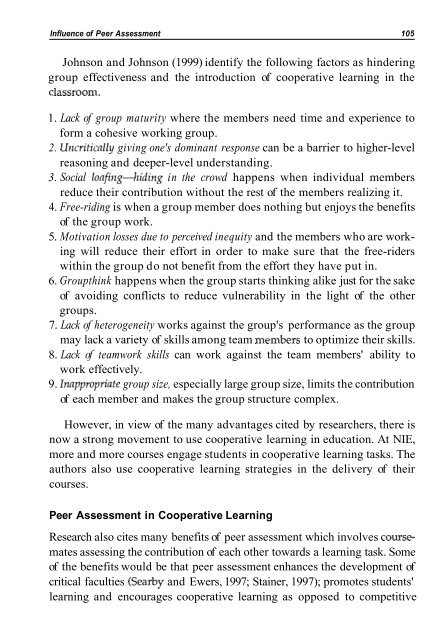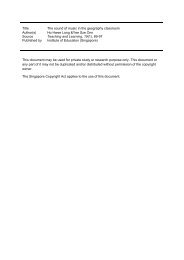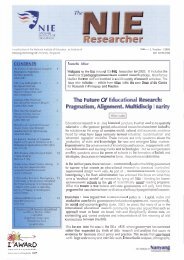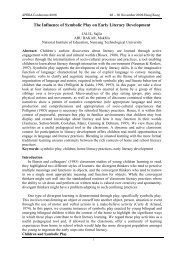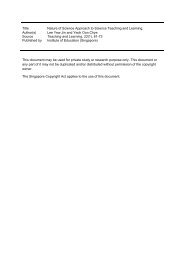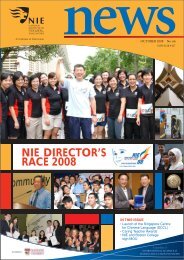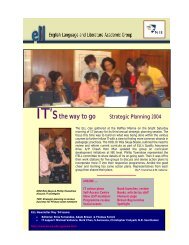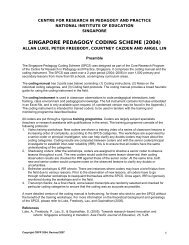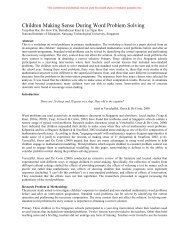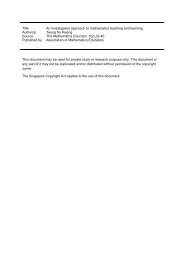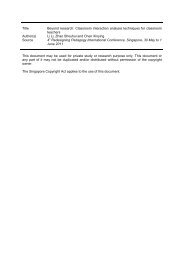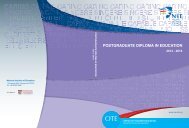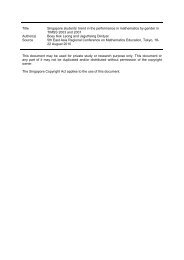Cooperative Learning - NIE Digital Repository - National Institute of ...
Cooperative Learning - NIE Digital Repository - National Institute of ...
Cooperative Learning - NIE Digital Repository - National Institute of ...
Create successful ePaper yourself
Turn your PDF publications into a flip-book with our unique Google optimized e-Paper software.
Influence <strong>of</strong> Peer Assessment 105Johnson and Johnson (1999) identify the following factors as hinderinggroup effectiveness and the introduction <strong>of</strong> cooperative learning in theclassroon~.1. Lack <strong>of</strong> group maturity where the members need time and experience t<strong>of</strong>orm a cohesive working group.2. Uilcritically giving one's dominant response can be a barrier to higher-levelreasoning and deeper-level understanding.3. Social loafiilg-hiding in the crowd happens when individual membersreduce their contribution without the rest <strong>of</strong> the members realizing it.4. Free-riding is when a group member does nothing but enjoys the benefits<strong>of</strong> the group work.5. Motivation losses due to perceived inequity and the members who are workingwill reduce their effort in order to make sure that the free-riderswithin the group do not benefit from the effort they have put in.6. Groupthink happens when the group starts thinking alike just for the sake<strong>of</strong> avoiding conflicts to reduce vulnerability in the light <strong>of</strong> the othergroups.7. Lack <strong>of</strong> heterogeneity works against the group's performance as the groupmay lack a variety <strong>of</strong> skills among team members to optimize their skills.8. Lack <strong>of</strong> teamwork skills can work against the team members' ability towork effectively.9. inappropriate group size, especially large group size, limits the contribution<strong>of</strong> each member and makes the group structure complex.However, in view <strong>of</strong> the many advantages cited by researchers, there isnow a strong movement to use cooperative learning in education. At <strong>NIE</strong>,more and more courses engage students in cooperative learning tasks. Theauthors also use cooperative learning strategies in the delivery <strong>of</strong> theircourses.Peer Assessment in <strong>Cooperative</strong> <strong>Learning</strong>Research also cites many benefits <strong>of</strong> peer assessment which involves coursematesassessing the contribution <strong>of</strong> each other towards a learning task. Some<strong>of</strong> the benefits would be that peer assessment enhances the development <strong>of</strong>critical faculties (Searby and Ewers, 1997; Stainer, 1997); promotes students'learning and encourages cooperative learning as opposed to competitive


